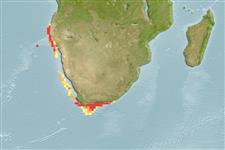Environment: milieu / climate zone / depth range / distribution range
ນິເວດວິທະຍາ
ສັດທະເລ; ລະດັບຄວາມເລິກ ? - 450 m (Ref. 36731). Tropical
Southeast Atlantic: South Africa and Namibia.
Length at first maturity / ຂະໜາດ / ນ້ຳໜັກ / Age
Maturity: Lm 9.5 range ? - ? cm
Max length : 17.0 cm SL ຕົວຜູ້/ບໍ່ມີເພດ; (Ref. 36731)
Short description
ສະລີລະວິທະຍາ | ການວັດແທກຮູບຮ່າງລັກສະນະພາຍນອກຂອງດິນ,ສັດ,ປາ…
Diagnosis: It hardly differs from the European anchovy (Engraulis encrasicolus); of other anchovies in southern and eastern African waters, species of Stolephorus have 3 to 7 sharp needle-like scutes along the belly, while species of Thryssa have compressed bodies and a keel of scutes along the belly (Ref. 189).
Pelagic in coastal waters, but down to a depth of about 400 m (Ref. 30573). It feeds on planktonic organisms (Ref. 30573). Larvae and juveniles were observed to be selective, raptorial carnivores and switched to non-selective filter feeding omnivory when adults. Caught with purse seines in South Africa and Namibia (Ref. 80687).
Life cycle and mating behavior
ການຈະເລີນເຕັມໄວ | ການສືບພັນ | ການວາງໄຂ່ | ໄຂ່ | ຄວາມດົກຂອງໄຂ່ປາ | ຕົວອ່ອນ
Bianchi, G., K.E. Carpenter, J.-P. Roux, F.J. Molloy, D. Boyer and H.J. Boyer, 1999. FAO species identification guide for fishery purposes. Field guide to the living marine resources of Namibia. FAO, Rome. 265 p. (Ref. 36731)
IUCN Red List Status (Ref. 130435)
Threat to humans
Harmless
Human uses
ການປະມົງ:
ຂໍ້ມູນຕື່ມອີກ
ຊື່ສາມັນຄຳສັບຄ້າຍຄືກັນການເຜົາໃໝ້ພະລັງງານໂດຍປ່ຽນທາດອາຫານໃນຮ່າງກາຍໃຫ້ກາຍເປັນຊີ້ນແລະໜັງຜູ້ລ້າການສຶກສາຜົນກະທົບຂອງສານຜິດທີ່ມີຜົນກະທົບຕໍ່ລະບົບນິເວດການສືບພັນການຈະເລີນເຕັມໄວການວາງໄຂ່ການສັງລວມການວາງໄຂ່ຄວາມດົກຂອງໄຂ່ປາໄຂ່Egg development
Age/Sizeການເຕີບໃຫຍ່Length-weightLength-lengthLength-frequenciesການວັດແທກຮູບຮ່າງລັກສະນະພາຍນອກຂອງດິນ,ສັດ,ປາ…ສະລີລະວິທະຍາຕົວອ່ອນການປ່ຽນແປງຂອງຕົວອ່ອນການທົດແທນທີ່ຄວາມອຸດົມສົມບູນBRUVS
ເອກະສານອ້າງອີງການລ້ຽງສັດນ້ຳຂໍ້ມູນການລ້ຽງສັດນ້ຳສາຍພັນກຳມະພັນElectrophoresesການຖ່າຍທອດທາງກຳມະພັນຈາກພໍ່ແມ່ຫາລູກພະຍາດການປຸງແຕ່ງNutrientsMass conversion
ຜູ້ຮ່ວມມືຮູບStamps, Coins Misc.ສຽງຫອຍມີພິດຊະນິດນຶ່ງທີ່ອາໄສໃນທະເລຄວາມໄວປະເພດການລອຍເນື້ອທີ່ເຫືອກOtolithsສະໝອງວິໄສທັດ
ເຄື່ອງມື
Special reports
Download XML
ແຫຼ່ງອີນເຕີເນັດ
Estimates based on models
Preferred temperature (Ref.
123201): 10.2 - 16.7, mean 13.7 °C (based on 40 cells).
Phylogenetic diversity index (Ref.
82804): PD
50 = 0.5020 [Uniqueness, from 0.5 = low to 2.0 = high].
Bayesian length-weight: a=0.00457 (0.00213 - 0.00980), b=3.12 (2.95 - 3.29), in cm total length, based on LWR estimates for this Genus-body shape (Ref.
93245).
ຊັ້ນເຂດຮ້ອນ (Ref.
69278): 3.0 ±0.1 se; based on size and trophs of closest relatives
Generation time: 1.2 ( na - na) years. Estimated as median ln(3)/K based on 1
growth studies.
ຄວາມຢືດຢຸ່ນ (Ref.
120179): ສູງ, ປະຊາກອນຕຳ່ສຸດທີ່ໃຊ້ເວລາສອງໜ້ອຍກວ່າ 15 ເດືອນ (Preliminary K or Fecundity.).
Prior r = 0.47, 95% CL = 0.31 - 0.71, Based on 1 stock assessment.
Fishing Vulnerability (Ref.
59153): Low vulnerability (11 of 100).
Climate Vulnerability (Ref.
125649): Low to moderate vulnerability (26 of 100).
Nutrients (Ref.
124155): Calcium = 347 [143, 896] mg/100g; Iron = 1.54 [0.71, 3.72] mg/100g; Protein = 17.9 [16.6, 19.3] %; Omega3 = 0.625 [0.326, 1.241] g/100g; Selenium = 50.5 [20.5, 129.2] μg/100g; VitaminA = 19.5 [4.1, 89.8] μg/100g; Zinc = 1.66 [0.99, 2.78] mg/100g (wet weight);
